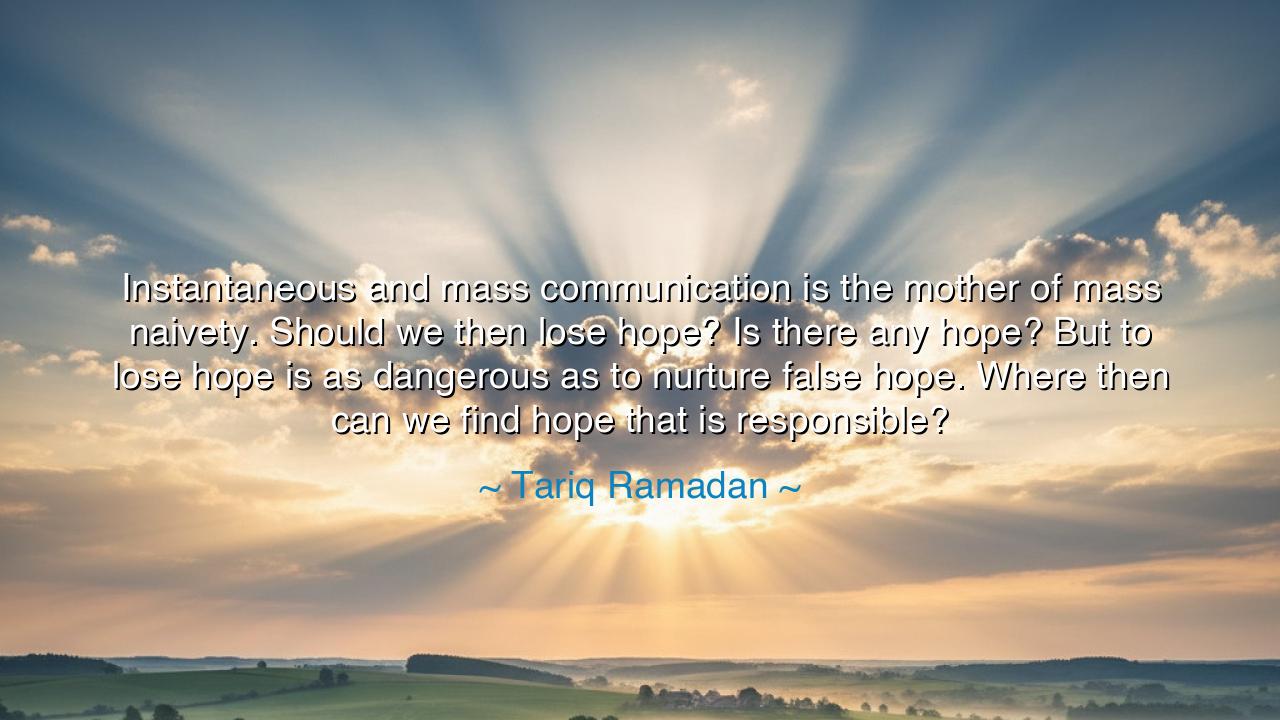
Instantaneous and mass communication is the mother of mass
Instantaneous and mass communication is the mother of mass naivety. Should we then lose hope? Is there any hope? But to lose hope is as dangerous as to nurture false hope. Where then can we find hope that is responsible?






Host: The room was dimly lit, the soft glow of the table lamp casting a warm light across the space. Outside, the quiet hum of the city seemed distant, the world slowly winding down for the evening. Inside, Jack sat at the desk, his fingers resting lightly on the edge of an open book, while Jeeny sat nearby, a cup of tea in her hands, her gaze on him as the weight of their conversation lingered in the air.
Jeeny: (breaking the silence, her voice thoughtful) “You know, Tariq Ramadan once said, ‘Instantaneous and mass communication is the mother of mass naivety. Should we then lose hope? Is there any hope? But to lose hope is as dangerous as to nurture false hope. Where then can we find hope that is responsible?’”
(She paused, looking at Jack with an understanding smile.) “What do you think he meant by that? About mass communication creating naivety and how we can find hope that’s responsible?”
Jack: (looking up slowly, his voice reflective as he considered the words) “I think Ramadan is pointing to the way we consume information today. With everything being instantaneous and easily accessible, it’s easy to fall into a kind of naivety — believing that what we hear or see is the truth, just because it’s out there, available right now. But that kind of quick, unchecked information can lead to false beliefs, misconceptions, and an oversimplification of complex issues.”
Jeeny: (nodding slowly, her voice steady) “Exactly. Mass communication has created a world where we’re bombarded with information constantly, but it’s hard to know what’s truthful or reliable. The speed of communication doesn’t leave room for careful consideration or deeper understanding. And that can create a kind of blind trust in what’s presented to us, without questioning or challenging it.”
Jack: (smiling faintly, his voice a little lighter now) “It’s a bit like a double-edged sword, isn’t it? On one hand, we have access to so much information and have the ability to connect with people around the world. But on the other hand, we’re also exposed to misinformation, half-truths, and distractions that don’t let us form a truly informed perspective.”
Jeeny: (gently, her voice full of empathy) “And that’s where hope becomes tricky, right? If we put our hope in the wrong things — in quick fixes, in superficial answers — we can be misled. But to lose hope altogether is just as dangerous. If we stop believing that change is possible or that there’s something worth working toward, we risk falling into despair.”
Jack: (thoughtfully, his voice quieter now) “So, the real question is, where do we find hope that’s responsible? Hope that isn’t naive or misplaced, but one that’s grounded in reality and in our ability to create real change. Hope that’s not about blind faith in the system, but about action and understanding.”
Jeeny: (smiling softly, her voice reassuring) “I think responsible hope comes from being critical and aware. It’s about questioning the information we receive, challenging what we’re told, and understanding that real change doesn’t come from waiting for a quick fix, but from working toward something better — with intention, care, and wisdom.”
Jack: (nodding slowly, his voice more confident now) “Hope isn’t just about expecting things to get better on their own. It’s about action — about knowing that change takes time, but also having the courage to pursue it, even when the road ahead is uncertain. That’s the kind of hope that’s grounded in reality, not in illusion.”
Jeeny: (smiling, her voice calm and full of clarity) “Exactly. And that’s the kind of hope that can lead to real transformation. One that’s aware of the challenges, but still willing to face them, to work through them.”
Host: The room felt quieter now, the weight of Ramadan’s words lingering between them. The idea that hope, when not based on reality or careful consideration, could easily become naive, was a sobering thought. But the understanding that hope could also be responsible — grounded in action, awareness, and critical thinking — filled the room like a quiet truth.
Jack: (softly, with a sense of peace) “I think that’s the key, isn’t it? Responsible hope comes from understanding the complexities, accepting the challenges, and still choosing to act. It’s about creating a future we believe in, one decision at a time.”
Jeeny: (nodding, her voice full of quiet certainty) “Exactly. Hope isn’t just something we feel. It’s something we create, by staying aware, staying informed, and staying committed to what we believe can be achieved.”
Host: The night outside settled in fully, and inside, the conversation turned into a quiet understanding. The power of responsible hope — one that was grounded in awareness and action — lingered in the space, a reminder that while the world could be overwhelming and unpredictable, there was always the choice to create a future worth believing in.
And in that realization, there was a peaceful clarity — the kind of hope that could endure.






AAdministratorAdministrator
Welcome, honored guests. Please leave a comment, we will respond soon